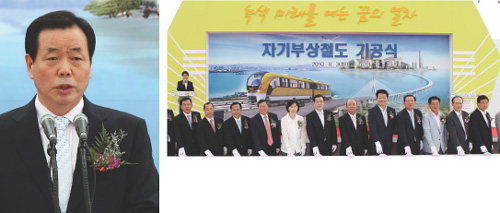Korea to Build Maglev Rail
Urban maglev trains to be in operation in 2013 at cost of 350 bln won

Korea will be the second nation in the world to run an urban maglev railroad when a 6.1 km-long city-type magnetic rail linking Incheon International Airport and Yongyu, Gyeonggi Province, is completed and open for commercial operation in 2013, the Ministry of Land, Transport and Maritime Affairs said on Aug. 3. Japan was the first nation in the world to build an urban maglev railroad for commercial operation in Nagoya in 2005.
The ministry held a ceremony to mark the start of the work on the projected magnetic railroad at the international airport with a number of dignitaries attending led by Minister Chung Jong-hwan, Incheon Mayor Song Young-kil and others totaling some 500.
The ministry said it completed the production of a number of rail cars to run on the magnetic railroad last year and they are being test-run at the Korea Machinery Research Institute in Daejeon.
The projected magnetic rail tracks extending for 6.1 km is being built linking the international airport and the Muei Tourism Complex in Yongyu, Gyeonggi Province, which will include six stations and a rail car terminal. It will be built at a cost of 350 billion won and is slated for completion in 2012 and for commercial operations in 2013 following a year of test-runs, the ministry said.
Six construction firms will take part in the construction of the railroad led by GS E&C.
The magnetic railroad cars don¡¯t require wheels, because it runs on magnetic power and the cars don¡¯t touch the rails. It also has a low noise level (65dB), low vibration and costs 30 percent less to operate than a general railroad. The magnetic train will run at a maximum speed of 110 km per hour. Shanghai, China, has been operating a high-speed magnetic railroad with a maximum speed of 413 km per hour.
In the meantime, the Office for the Four Major Rivers Restoration Project will invite 100 families with elementary and middle school children for a one-night, two-day family camping event beginning August 21 at the Yeoju Riverside Amusement Park.
During the event, the families will enjoy various free programs such as a drawing contest, Hwangpo sailboat boarding, pottery making, ¡°My¡± tree planting, a visit to the four major rivers museum and a family concert, etc. In particular, the families will be given a certain amount of water for two days, and among them, the family that uses the least will be awarded a prize.
The office says that this camping event is designed to raise awareness of the importance of water as a future resource and provide a good opportunity for ordinary citizens to visit and experience the historical river restoration sites. Any family with elementary and middle school children that want participate in the camping excursion can apply from August 2-8 at www.4rivers.go.kr. The list of participants will be released on August 11.
The Ministry of Land, Transport and Maritime Affairs announced that it successfully developed the Instrument Landing System (ILS) with Korea¡¯s own technology, and has invited 13 aviation personnel from seven different countries including Cambodia and Tanzania to give instructions on operation and maintenance techniques using the ILS for three weeks starting from Aug. 2. The ILS is a ground-based instrument approach system that provides precision guidance to an aircraft approaching and landing on a runway using a combination of radio signals and, in many cases, high-intensity lighting arrays to enable a safe landing during instrument meteorological conditions (IMC), such as low ceilings or reduced visibility due to fog, rain or blowing snow. The invited aviation personnel will have lectures on the ILS and training programs during which they can use installed equipment at a training institute to learn how to install, operate, maintain and monitor the system.
During the training programs the trainees will find opportunities to learn about the ILS, the most sophisticated systems with which aviation personnel can lead aircraft to a safe landing even in during bad atmospheric conditions, such as when visibility is as low as 100 meters. nw
(left) Korea Railway Network Authority Chairman & CEO Cho Hyun-yong gives a speech at the ground-breaking ceremony. A number of dignitaries push buttons to kick off the construction of an urban maglev railroad linking the Incheon International Airport and Yongyu, Gyeonggi Province on Aug. 3, which will make Korea only the second nation in the world to have such railroad after Japan when it is completed in 2012. Dignitaries on hand at the ceremony included Minister Chung Jong-hwan of the Ministry of Land, Transport and Maritime Affairs and Incheon Mayor Song Young-kil, among others.
3Fl, 292-47, Shindang 6-dong, Chung-gu, Seoul, Korea 100-456
Tel : 82-2-2235-6114 / Fax : 82-2-2235-0799